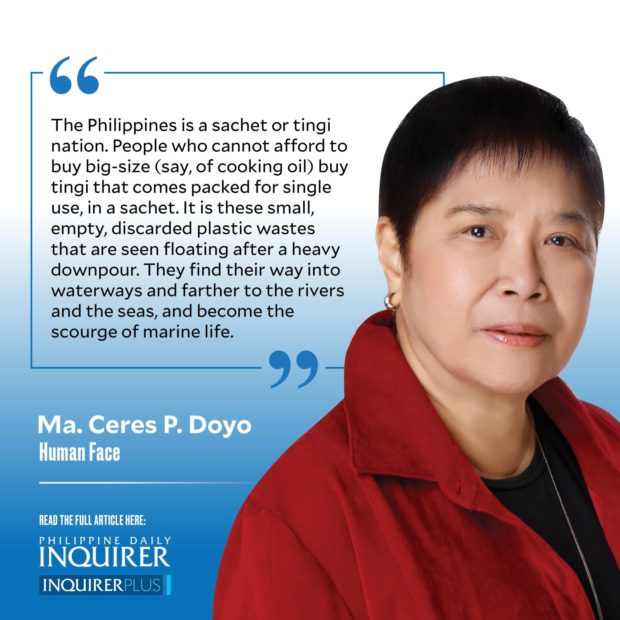‘Tingi’/sachet nation
Inquirer banner story headline last Sunday: “Tax on plastics, online sales gets new push.” Part of the blurb below the headline said that “to boost [government] revenue, Finance Secretary Benjamin Diokno says the new administration plans to tax all online transactions, which can raise P13.2 billion annually, and earn another P1billion from an excise on single-use plastics.”
The part of the blurb on single-use plastics should be music to the ears of environmentalists but perhaps not to those who have no choice but to use them in their daily lives and livelihoods. The news report said that the bill passed by the House last year will impose an excise of P20 per kilo of single-use plastic bags used in retail outlets.
Article continues after this advertisementI am still trying to picture its trickle-down effect. Does this mean that sellers who buy and use plastics will have to spend more for the plastics and then pass on the added cost to consumers? Will sellers and consumers really balk given the convenience plastics give them?
That is as far as collecting more taxes go, but will the excise really prevent the use of more plastics that clog and destroy the environment? Plastics are the most convenient packaging material, and unless something more environmentally friendly is invented, plastics and foil will continue to be in use.
But one thing worked and caught on. Local ordinances banning the use of plastic bags in supermarkets and retail stores have shoppers now bringing their own reusable shopping bags. In my bag is a light reusable that when rolled is the size of a matchbox. The grocery cashier always asks if the shopper has an eco-friendly tote and, if none, offers a carton with no extra charge.
Article continues after this advertisementThe bigger problems are in the manufactured items that come in small packages made of nonbiodegradable materials, the sachets. Three-in-one coffee mix, creamers, ketchup, sugar, shampoo, conditioner, sauces. Name it. Corner sari-sari stores sell food items in plastic sachets—black pepper, cooking oil, MSG, crackers—as well as hygiene products. Go to a sari-sari store in a depressed area and find all kinds of single-use items sold individually, sanitary pads among them. Tingi.
The Philippines is a sachet or tingi nation. People who cannot afford to buy big-size (say, of cooking oil) buy tingi that comes packed for single use, in a sachet. It is these small, empty, discarded plastic wastes that are seen floating after a heavy downpour. They find their way into waterways and farther to the rivers and the seas, and become the scourge of marine life.
This is not to put the blame entirely on the cash-strapped consumers who can only afford tingi. Manufacturers should find a way to package and sell their products in a consumer-friendly but also environment-friendly way. And consumers must know how to properly dispose of the packaging that is plastic.
The French word “sachet” means “little sack” or pouch that contains small items like perfume, potpourri, and such. But when I googled it, I was surprised to read that it is a “term mostly used in the Philippines.” Now, we have a French word in our everyday vocabulary. As in, pabili po ng isang sachet ng shampoo with conditioner.
Taxing plastic bags to make them vanish slowly from our lives is easier than banning sachets altogether. What is the alternative? They are as ubiquitous as the plastic forks and spoons that go with fast food orders.
GAIA (Global Alliance for Incinerator Alternatives), an advocacy group for the environment, says: “Sachets may have brought better quality products to poor communities but the problem is that they have become a waste nightmare … There is this crucial necessity to craft regulations that would include sachets in the big picture, and to demand accountability from the companies that manufacture them…
“Comprising an estimated 52 percent of the residual plastic waste stream, sachets have been accumulating in the environment, where they defile the natural landscape, choke waterways, harm wildlife, and threaten livelihoods like tourism and fisheries. Filipinos use a staggering amount—around 164 million per day.”
A World Bank report, “Marine Plastic Management: The Gender Dimensions,” cited the Philippines as one of several Asian countries that contribute 55-60 percent of global plastic waste leakage.
—————-
Send feedback to [email protected]
















